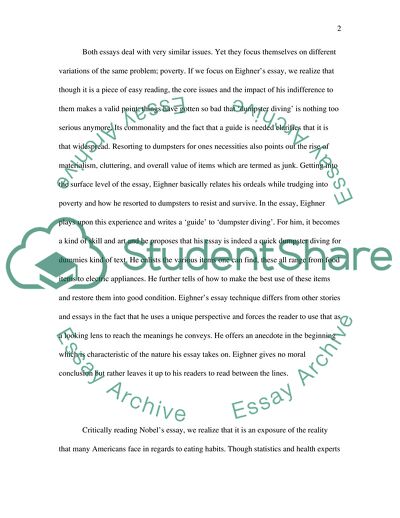Cite this document
(Comparison of Dumpster Diving by Lars Eighner and America's Wandering Essay, n.d.)
Comparison of Dumpster Diving by Lars Eighner and America's Wandering Essay. https://studentshare.org/literature/1739814-comparison-and-contrast-between-two-essays-on-dumpster-diving-by-lars-eighner-and-americas-wandering-families-by-loretta-schwartz-nobel
Comparison of Dumpster Diving by Lars Eighner and America's Wandering Essay. https://studentshare.org/literature/1739814-comparison-and-contrast-between-two-essays-on-dumpster-diving-by-lars-eighner-and-americas-wandering-families-by-loretta-schwartz-nobel
(Comparison of Dumpster Diving by Lars Eighner and America'S Wandering Essay)
Comparison of Dumpster Diving by Lars Eighner and America'S Wandering Essay. https://studentshare.org/literature/1739814-comparison-and-contrast-between-two-essays-on-dumpster-diving-by-lars-eighner-and-americas-wandering-families-by-loretta-schwartz-nobel.
Comparison of Dumpster Diving by Lars Eighner and America'S Wandering Essay. https://studentshare.org/literature/1739814-comparison-and-contrast-between-two-essays-on-dumpster-diving-by-lars-eighner-and-americas-wandering-families-by-loretta-schwartz-nobel.
“Comparison of Dumpster Diving by Lars Eighner and America'S Wandering Essay”. https://studentshare.org/literature/1739814-comparison-and-contrast-between-two-essays-on-dumpster-diving-by-lars-eighner-and-americas-wandering-families-by-loretta-schwartz-nobel.


